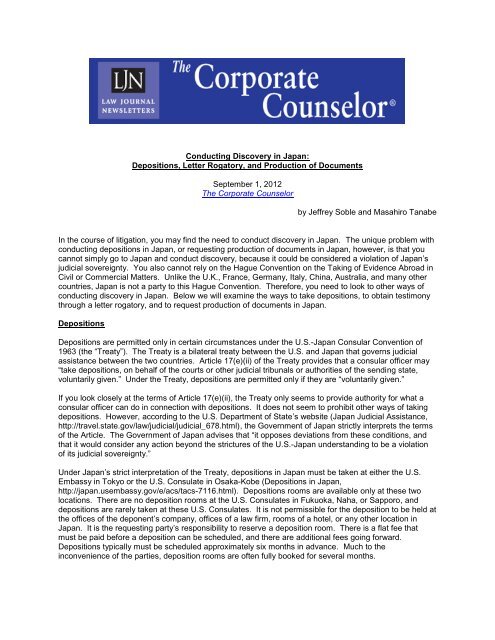The Function of Letters Rogatory in International Regulation: Secret Insights
Letters rogatory serve as a critical tool in international law, promoting cross-border legal aid by allowing territories to officially ask for evidence and activities from one an additional. Rooted in historical precedents and formalized with agreements like the 1970 Hague Convention, these requests are crucial for fostering global participation. Nevertheless, their implementation frequently encounters significant hurdles, including inconsistencies in legal criteria and step-by-step hold-ups, which can prevent their effectiveness. Recognizing the nuances of this process elevates essential inquiries about global collaboration and the prospective reforms required to enhance its reliability. What ramifications might these obstacles have for future legal proceedings?
Meaning of Letters Rogatory
In the realm of global law, letters rogatory function as formal demands released by a court in one territory to look for support from a court in one more jurisdiction. Letters rogatory. These requests are especially significant in cross-border lawful procedures, where the enforcement of a court's order or the event of evidence might be hampered as a result of jurisdictional constraints

The process generally needs the requesting court to express the specific info or activity needed from the international court, sticking to the lawful protocols and conventions established between the jurisdictions involved. Once provided, the letters rogatory are transferred with polite networks, which may include consulates or consular offices, to make certain that the demand is recognized and acted on by the foreign court. In general, letters rogatory exhibit the cooperative structure vital for effective international legal processes.
Historic Context
Although the practice of letters rogatory has ancient origins, its formalization within the structure of international law emerged significantly in the 20th century. Historically, such ask for judicial support were made use of in numerous legal traditions, including Roman law, where they promoted cross-border participation in legal issues. The principle acquired restored interest with the rise of globalization and the boosting intricacy of global lawful interactions.
The mid-20th century saw the establishment of treaties and conventions that sought to systematize the process of letters rogatory. Especially, the 1970 Hague Convention on the Taking of Proof Abroad in Business or civil Matters offered an organized method, boosting the efficiency of these demands - Letters rogatory. This duration noted a shift from informal plans to a more organized structure, which resolved the obstacles postured by differing nationwide lawful systems
As states became extra synergistic, the demand for effective systems to gather evidence throughout borders emerged, enhancing the function of letters rogatory in assisting in global collaboration. Today, they continue to be a critical tool for acquiring evidence and making sure that justice transcends national borders, showing the progressing nature of international regulation in response to worldwide challenges.
Refine of Issuing Demands
The process of providing letters rogatory commonly involves several essential steps designed to make sure that requests for judicial support are clear, specific, and certified with both domestic and global lawful criteria. Initially, a celebration seeking aid needs to prepare a formal request that outlines the essential truths of the case, the relief sought, and the certain proof or statement called for. This document should be crafted with accuracy to meet the legal requirements of the jurisdiction in which it will certainly be sent.
Adhering to the preparation of the request, it is sent to the suitable authority, typically a court or a designated governmental agency. This authority reviews the request to guarantee it adheres to procedural norms and legal criteria. When approved, the demand is transferred to the foreign jurisdiction through polite channels.
Upon receipt, the international court examines the demand's conformity with its neighborhood laws and methods (Letters rogatory). If accepted, it proceeds to execute the demand, which might include the issuance of subpoenas or the collection of proof. Throughout this process, keeping clear interaction in between the requesting and receiving jurisdictions is essential to guarantee successful cooperation and the fulfillment of the demand
Challenges and Limitations
Constraints and difficulties frequently occur in the procedure of carrying out letters rogatory, usually originating from varying lawful systems and procedures in between jurisdictions. One significant challenge is the differing standards of admissibility for evidence, which can result in problems in the acceptance of documents asked for through letters rogatory. Furthermore, the lack of harmony in legal terminology and definitions can develop misconceptions, making complex communication in between courts in different countries.
In addition, hold-ups are common due to bureaucratic processes, as the demand might require to go through numerous layers of legal authorities prior to it is fulfilled. In some circumstances, the requested jurisdiction might do not have the necessary sources or willingness to cooperate, further preventing the procedure. Language obstacles also add to difficulties, as precise translation of lawful records is important for making sure that the intended message is communicated without distortion.
Finally, sovereignty issues might emerge, as some read review states hesitate to abide by demands that they perceive as infringing upon their lawful freedom. These obstacles highlight the intricacies intrinsic in making use of letters rogatory, necessitating greater harmonization and collaboration amongst worldwide lawful systems to enhance their performance.

Influence On International Participation
Identifying the relevance of letters rogatory in promoting international collaboration is vital, as these demands assist in cross-border lawful aid and promote joint initiatives in civil and criminal issues. By allowing one territory to officially ask for assistance from an additional, letters rogatory develop an organized legal framework that improves the effectiveness of international interaction between judicial authorities.
The usage of letters rogatory assists to develop common depend on and respect among nations, which is vital in an increasingly interconnected globe. They offer as a device not only for collecting evidence however additionally for guaranteeing that lawful processes are supported throughout borders. get more This is particularly crucial in combating multinational criminal offense, where the lack of ability to secure participation can undermine justice.
Furthermore, the reliance on letters rogatory can enhance complex legal proceedings, lowering delays and uncertainties in global examinations. The procedural safeguards fundamental in this process add to the defense of private legal rights while assisting in teamwork among states. Ultimately, the impact of letters rogatory on international participation emphasizes their duty as important devices in the More hints promotion of justice, promoting a collaborative spirit that goes beyond lawful systems and nationwide limits.
Verdict
Finally, letters rogatory offer as an important instrument in global regulation, assisting in cross-border legal aid and participation. Regardless of inherent obstacles such as varying lawful requirements and administrative delays, their standardized treatments advertise depend on among countries. The ongoing development of these systems is essential for enhancing the efficiency of international lawful procedures, ultimately fostering more powerful cooperation in both civil and criminal matters across territories. The value of clear communication in this context can not be overemphasized.
Letters rogatory offer as a pivotal instrument in global legislation, assisting in cross-border legal aid by enabling territories to officially ask for evidence and activities from one another.The procedure generally calls for the asking for court to articulate the particular information or activity needed from the international court, adhering to the lawful methods and conventions developed in between the jurisdictions involved. Historically, such requests for judicial support were used in numerous legal practices, consisting of Roman legislation, where they helped with cross-border participation in legal issues.The process of providing letters rogatory usually involves several crucial steps designed to make sure that demands for judicial help are clear, certain, and compliant with both domestic and global legal criteria.In addition, hold-ups are typical due to bureaucratic processes, as the demand may require to pass through numerous layers of legal authorities before it is fulfilled.